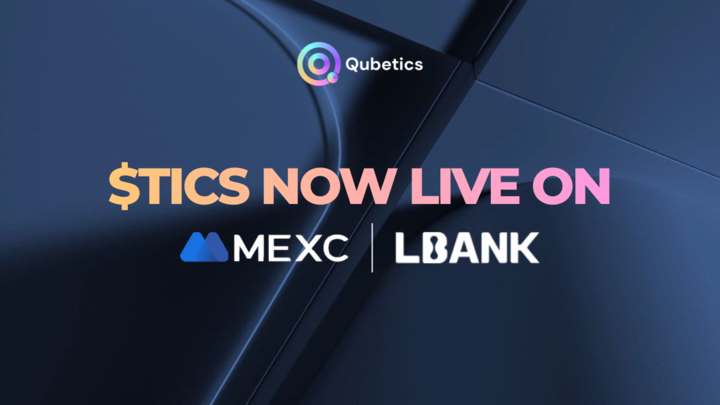Can a crypto project really rise from $0.01 to $4.20 in one hour, and still have room to grow? That’s the question many are now asking about Qubetics. As markets start focusing on long-term utility and user-owned infrastructure, Qubetics is standing out with real-world applications like a decentralized VPN, powerful governance via Delegated Proof of Stake (DPoS), and a unified Layer 1 chain that simplifies cross-chain movement. Community members are beginning to take notice as more assets shift toward ecosystems with actual products, not just speculative tokens. Qubetics isn’t just catching attention because of price action, but because of its unique structure that rewards both validators and delegators with 30% APY while enabling privacy-focused tools like tokenized bandwidth.
Recent moves by Ethereum and Toncoin are also driving attention toward alternatives. While Ethereum debates internal scaling issues and Toncoin sees renewed uncertainty following external news, Qubetics is gaining traction across both technical and user-experience fronts. From interoperability to staking rewards, it covers key functions that crypto participants demand from day one. That’s why more early adopters and long-term holders are naming Qubetics the best crypto for beginners, especially as new market entries look for real ROI potential in utility-based platforms. This article breaks down Qubetics’ most valuable features, analyzes its early results, and compares it to Ethereum and Toncoin’s current market developments.
Qubetics Decentralized VPN Is Changing the Privacy Game
One of the most powerful applications inside the Qubetics ecosystem is its decentralized VPN (dVPN). Unlike traditional VPNs that rely on centralized servers, Qubetics’ dVPN runs on a peer-to-peer blockchain network where no single authority controls data flow. This ensures that internet traffic remains uncensored, private, and fully under the control of the user. The infrastructure is built for those who value not only privacy but also full digital freedom. Using $TICS tokens, users can share unused bandwidth and get rewarded, essentially turning internet access into a tradable, blockchain-secured asset. This adds economic utility on top of core privacy protections.
For example, a token holder with excess bandwidth can offer it to the network and earn $TICS while someone else uses that route to access the internet privately. With multi-hop routing and end-to-end encryption baked into its design, the dVPN ensures no logs are stored, and identities stay hidden. This is not just a privacy tool, but a financial opportunity for participants. For those exploring utility-backed protocols, Qubetics stands out as the best crypto for beginners seeking both use cases and security from the start.
DPoS Governance Translates to Fair Earning Power on Qubetics
Qubetics is powered by Delegated Proof of Stake (DPoS), a governance model that puts real control in the hands of its token holders. Participants can either become validators by holding 25,000 $TICS or delegate their tokens to validators if they hold at least 5,000 $TICS. Validators earn 30% APY, while delegators earn a portion of that based on the amount staked. This structure is not only efficient but also promotes accountability through voting power. If a validator underperforms or behaves dishonestly, they can be voted out and replaced.
This approach increases security while also offering passive income potential. Delegators don’t need technical expertise or hardware, they just need to select a reliable validator and stake their tokens. Qubetics has designed this system to reward those who participate without overcomplicating the process. DPoS also ensures that decision-making stays decentralized and scalable, unlike traditional blockchains with congested validator pools. As new participants search for the best crypto to buy now, Qubetics provides a clean entry point through community-driven validation and fair compensation systems.
Qubetics Launch Data Reinforces Early Growth Potential
From its presale price of $0.01, Qubetics launched at $0.40 and hit a high of $4.20 in the first hour of exchange listing. That 950% price surge from launch, or a 420x gain from presale, turned many early entries into massive profit cases. With over 517 million tokens distributed and more than $18.4 million raised from 28,500 participants, it quickly reached a $700,000 trade volume in just the first 24 hours on MEXC. It now holds strong support around the $2 mark with consistent buy pressure noted at that level.
Take the $10,000 presale scenario. An early participant who bought at $0.01 would have received 1 million $TICS. At the $4.20 all-time high, that bag would have reached $4.2 million. Even if not sold at the peak, this still illustrates the type of returns markets have rewarded early backers with. Now trending in the CoinMarketCap Top 10, Qubetics is gaining long-term attention, especially from those who missed its first breakout. With projections between $10 and $15 after the mainnet launch, the momentum remains strong. Its ability to deliver real-world functionality alongside financial upside is why many now call it the best crypto for beginners.
Ethereum Faces Internal Pressure Over Gas Limit Proposal
Ethereum co-founder Vitalik Buterin has proposed a new strategy that could significantly impact gas fees by introducing EIP-4488 and now EIP-7983, which aims to increase the calldata gas limit from 1MB to 6MB. This proposal is meant to offer more breathing room for rollups like Optimism and zkSync to operate efficiently without bottlenecks. However, not everyone in the Ethereum developer community is onboard. Concerns have surfaced that this update could place unexpected pressure on the network’s nodes, potentially leading to memory and performance issues.
The intention behind the proposal is to improve transaction throughput, particularly for Layer 2 solutions, but it has ignited debates over decentralization versus scalability. Critics argue that unless Ethereum’s base layer becomes more efficient, stacking more transactions through rollups may only shift the congestion problem, not solve it. With Ethereum being such a dominant force in DeFi, even small protocol decisions create ripple effects across the broader market. The discussion continues, with no final implementation date confirmed yet, but the uncertainty has left many early users waiting for clarity before engaging with new apps or bridging assets across layers.
Toncoin Sees Dip Following UAE Residency Clarification
Toncoin recently experienced a brief sell-off after clarification from UAE officials that the newly launched UAE-Toncoin visa program was not officially tied to any government partnership. While the visa offering had attracted attention for combining blockchain tech with residency programs, the regulatory correction caused Toncoin’s market to react sharply. Although the UAE is friendly toward digital assets, the statement clarified that the visa was issued by a third-party entity and had no direct association with any federal department.
This clarification sent Toncoin sliding by more than 12% within hours, shaking some confidence among newer market participants. The coin had previously gained strong interest following its integration into Telegram’s expanding Web3 features, including wallet and payment tools. However, this episode reminded community members that association with national programs must be clearly established to prevent misinterpretation. While the project still benefits from its Telegram ecosystem exposure, regulatory missteps, even perceived ones, can shift sentiment quickly. Toncoin continues to be one of the more active altcoins in user engagement, but trust will need to be rebuilt around official messaging.
Why Qubetics May Still Be the Best Crypto for Beginners in 2025
Ethereum is managing internal debates over scalability fixes, while Toncoin is recovering from reputation concerns. Qubetics, on the other hand, has rolled out a functioning application suite, transparent staking rewards, and rapid price action backed by utility. Its decentralized VPN, Delegated Proof of Stake (DPoS) model, and seamless Layer 1 interoperability give it the framework to compete with more mature networks. The ability to make cross-chain transfers without KYC, without bridges, and without high fees has helped it build early credibility.
While Ethereum refines proposals and Toncoin stabilizes from branding missteps, Qubetics is building quietly and climbing market rankings. It’s now among the most talked-about entries of the year. Participants looking for the best crypto to buy now are weighing past gains alongside utility. And with a working governance system based on Delegated Proof of Stake (DPoS), the project brings transparency and community-driven momentum. For early users and those entering crypto in 2025, Qubetics currently checks many of the boxes being looked for in the best crypto for beginners.
For More Information:
Qubetics: https://qubetics.com
Telegram: https://t.me/qubetics
Twitter: https://x.com/qubetics
FAQs
What makes Qubetics the best crypto for beginners in 2025?
Qubetics offers practical tools like a decentralized VPN, easy staking with 30% APY, and passive income through delegation, making it a well-rounded choice for newcomers.
How does Qubetics’ DPoS model work?
Token holders vote for validators, who then process transactions and secure the network. Rewards are shared between validators and delegators.
Is Qubetics a better option than Ethereum or Toncoin for new users?
While each has strengths, Qubetics’ all-time high, practical apps, and early user profits suggest it could be the best crypto for beginners.
Blog Summary
Qubetics ($TICS) is capturing serious attention in 2025 after its rapid rise from a $0.01 presale to an all-time high of $4.20 within the first hour of launch. Backed by a decentralized VPN, a governance model using Delegated Proof of Stake (DPoS), and seamless cross-chain capabilities, it’s positioning itself as one of the best crypto for beginners. Ethereum is currently working through internal debates over calldata expansion, while Toncoin is stabilizing after a clarification from UAE regulators. As Qubetics trends in the CMC Top 10, its 30% APY staking rewards and token utility are making it a compelling case for early participants and those still entering the market. With $18.4 million raised and strong trading volumes, its future growth looks aligned with projections of $10–$15 post-mainnet.
Disclaimer: Any information written in this press release does not constitute investment advice. Optimisus does not, and will not endorse any information about any company or individual on this page. Readers are encouraged to do their own research and base any actions on their own findings, not on any content written in this press release. Optimisus is and will not be responsible for any damage or loss caused directly or indirectly by the use of any content, product, or service mentioned in this press release.



